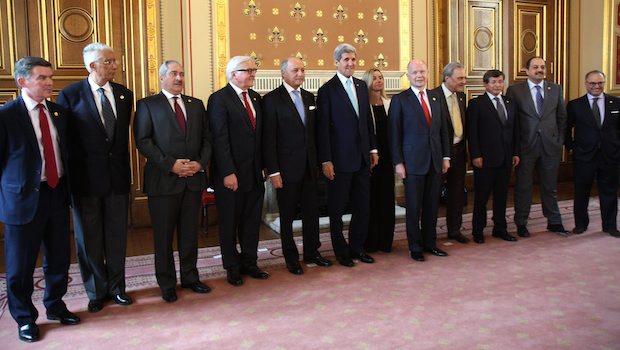
A group photograph taken before the start of the Friends of Syria Meeting in London on May 15, 2014. (EPA/BRITISH FOREIGN AND COMMONWEALTH OFFICE HANDOUT)
London, Asharq Al-Awsat—The Friends of Syria Core Group, which met in London on Thursday, will “take further steps . . . to increase support for the moderate opposition National Coalition” and the moderate military opposition, according to a final statement released after the conference.
The Core Group or “London 11,” which includes Saudi Arabia, Egypt, Jordan, Qatar, the United Arab Emirates, Turkey, the United States, the United Kingdom, Germany, Italy and France, also called on the “entire international community” to denounce presidential elections planned by Syrian President Bashar Al-Assad, describing them as “illegitimate” and a “parody of democracy.”
Addressing the Core Group, US Secretary of State John Kerry said of the elections: “We stand in one unified voice with rejecting any notion whatsoever that the elections that the Assad regime has called somehow have any legitimacy whatsoever.”
The group also promised unspecified aid for the Coalition’s Supreme Military Council, which commands the Free Syrian Army (FSA) operating on the ground inside the country.
In response to a question from Asharq Al-Awsat, Kerry said: “The Free Syrian Army has clearly improved. It has clearly gained in its capacity. It has gained in its command and control. It is also now being supported in a more coordinated way than it was over the last year as one country or another may have been supporting one group or another, now that is much more concentrated.”
“We are committed to continue to be helpful to them and give them greater capacity in many different respects. And everybody there today shared in that commitment,” he added.
While Kerry declined to discuss the specifics of military support that might be offered to the FSA, Rime Allaf, an adviser to Coalition head Ahmed Al-Jarba, told Asharq Al-Awsat: “The Core Group of the Friends of Syria are now supporting the Supreme Military Council. The receipt of anti-tank missiles was an initial experience that succeeded in demonstrating the capacity to confront Assad’s forces and extremist parties.”
Answering a question from Asharq Al-Awsat about the use of chemical weapons by the Assad regime, Kerry said: “It has been made clear by President [Barack] Obama and others that use would result in consequences.” But he added that those consequences might not necessarily be US-led, saying the International Criminal Court could choose to prosecute those responsible.
Both Human Rights Watch and French Foreign Minister Laurent Fabius said this week they had evidence of further chemical weapons being used by the Assad regime in Syria after an attack in the Damascus suburbs killed hundreds of civilians last August.
Kerry acknowledged having seen the French evidence during Thursday’s meeting, saying “it’s not verified yet,” but that, if proven, “that would be against the agreements of the chemical weapons treaty and against the weapons convention that Syria has signed up to” following the August attack.
The Friends of Syria met in the same week that UN–Arab League joint envoy Lakhdar Brahimi resigned, citing the failure of peace talks between the opposition and the Assad regime in Geneva earlier this year.
But in his opening remarks to the conference, Kerry said: “We gathered here, I think it’s safe to say, frankly more united than we have been in some time,” referring to past divisions in the group. “And we, all of us, unanimously, remain committed to changing the dynamics on the ground in Syria.”
British Foreign Minister William Hague, who hosted the London 11 meeting, highlighted the strength of ties with the opposition Coalition by announcing that the UK had “decided to upgrade the status of the National Coalition’s Representative Office here in London to a ‘Mission’ in recognition of the strength of our partnership,” moving to follow a similar decision by Washington.
But Russia was quick to criticize the London meeting, accusing the Core Group of taking a “destructive” stance.
The Interfax news agency quoted Deputy Foreign Minister Mikhail Bogdanov as saying: “Unlike some of our Western partners meeting in London, we work with all Syrian sides, not just with one as if supporting it against the other.”
